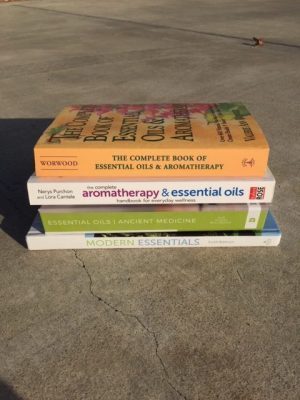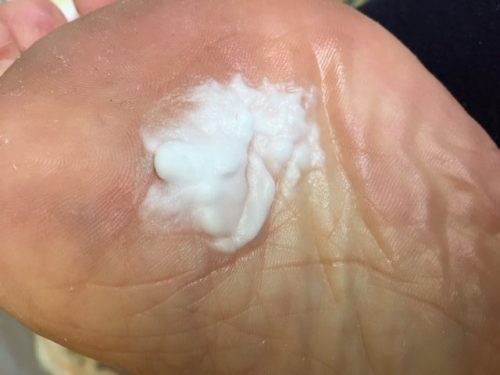Essential oils have been around for ages, and they have been an important part of healing for centuries. Not only were they used in Biblical times, but also by the ancients Greeks, Egyptians, and Chinese, as well as by others. People have used essential oils for many ailments, disease prevention, for cleaning, and in personal care products.

Different oils have different properties ranging from being antimicrobial, anti-inflammatory, antidepressant, detoxifying, diuretic, strengthening the liver, expectorant, sedative, stimulant, vasoconstrictor, and vasodilator, just to name some of them.
One can use single oils or one can use blends.
Essential oils (EO’s) can be used topically, diffused, directly inhaled, and in baths. Some people also ingest EO’s, but I am not a big advocate of this unless someone really knows what they are doing. I, for the most part, believe you can get great results with the other methods. Also, there are those who advocate using in cooking, such as Axe, Rubin, and Bollinger below. In fact, they include recipes in their book.
Dr. Josh Axe claims that essential oils were an important part of helping his mother heal from cancer. Author Jordan Rubin found essential oils played a critical role in his own victory against an aggressive metastatic cancer. Together they, with health advocate Ty Bollinger, wrote Essential Oils, a handy essential oil resource.
How Essential Oils Work
According to EO expert Valerie Ann Worwood, one way essential oils work is that they increase blood flow to tissues, and that means more nutrients and oxygen, and removal of waste products.
Worwood shares the story in her book, The Complete Book of Essential Oils & Aromatherapy, how one man, Rene-Maurice Gattefosse, a French chemist, accidentally burned his arm badly, and thrust it into a tub of lavender oil. This not only lessened the pain, but the wound healed quickly without blistering or scarring. He devoted the rest of his life studying essential oils.
Modern Essentials authors maintain that “essential oils embody the regenerating, protective, and immune-strengthening properties of plants”. They also say essential oils can cross the blood-brain barrier, thereby being able to beneficially effect the limbic system which can effect memory, emotions, neurotransmitters, and smell.
Treat Essential Oils with Great Respect
Essential oils are potent and one should use knowledge and care when using them.
- Most EO’s should be diluted with a carrier oil such as coconut oil or almond oil. They are not only safer to use when diluted, but also often more effective.
- Beware of the EO’s that cause sensitivity to the sun, and avoid sun exposure as directed.
- Keep out of the reach of children just as you would medications and supplements. Small amounts ingested can be lethal.
- Only ingest in special circumstances, like with the advice of a qualified practitioner.
- Know that the very young and the elderly are more sensitive to EO’s, therefore extra care needs to be taken with these populations.
- Some oils need to be avoided entirely for some individuals, such as the ones mentioned above, and in pregnant and nursing mothers.
- Buy a high-quality, non-diluted, unadulterated EO from a reputable company that gets tested by a third party, that is wild crafted or organic, and that has its botanical Latin name listed. Avoid significantly cheaper oils as they are probably not pure or high in quality.
- Obtain at least one good book on EO’s as a reference for advice on how to use them safely and efficaciously, and what to use them for. Consider buying a couple so that you can compare them.

My Experience with Essential Oils
I have had first hand experience in essential oils helping with wound healing, soothing abdominal pain, stress reduction, congestion, insomnia, infections, bee stings, immune support, and much more. I started out a skeptic, but have been shown time and again that essential oils really do work.
I used one homemade blend of 3 oils behind my ears down to my jawline to alleviate a stubborn bout with vertigo successfully. I got that recipe of helichrysum, geranium, and lavender from Modern Essentials.
I made another blend for a daughter who was in labor with her 2nd child. She claims it made a big difference using it during that labor and a subsequent 3rd pregnancy labor.
I could go on and on.
In fact, I shared the following story in one of my past email newsletters for my subscribers. (By the way, don’t miss out on future emails for content you would most likely not otherwise see by signing up for my non-spammy newsletter here.)
So, recently I was stung by a bee when I accidentally stepped on one in my driveway.
Since I have histamine issues, my first thought was fear that I might overreact to this bee sting. Historically, I get bad reactions from mere mosquito bites. But I can only remember one other time being stung by a bee a long time ago, and it was no big deal, except it being extremely painful; and I do not have a known allergy to bee stings (but, one can always develop one).
Anyway, I plucked the stinger out with tweezers, then read later you must scrape the stinger so that you don’t cause more release of the bee venom, which happens when you use tweezers. I knew this, I just forgot. Then I hobbled over to get an ice pack from our freezer while consulting with my essential oil books. (I have 4 of them, which are more or less helpful determining the course that seems best to take in different situations.)
This is what I did:
*Bee Sting Paste
1 teaspoon baking soda
1 drop chamomile essential oil
1 drop lavender essential oil
A few drops of filtered water, enough to make a paste
Mix and apply.
The baking soda is supposed to counteract the acidity of the bee sting according to Purchon & Cantele.
*Recipe taken from Aromatherapy & Essential Oils by Nerys Purchon and Lora Cantele.

Anyway, when I applied the paste, the afflicted area on the ball of my foot was about the size of a quarter, red, and throbbing with fiery pain. I kept the paste on for 30 minutes. I couldn’t keep it on longer because I got killer bored just sitting there. When I removed it there was only a small amount of discomfort and a dime-sized area of redness. Very remarkable. A few hours later there was no pain and only a tiny dot where the stinger had entered. End of story.
So of course I highly recommend this course of treatment for a bee sting.
Consider adding this to your bag of remedies. You might also need some Benadryl to take orally, and if you are showing alarming allergic reactions like vomiting, throat swelling, difficulty breathing, etc. go to the ER, or call 911 if the symptoms are severe.
I pretty much hate shoes and only wear them when I have to. Did I learn my lesson? No. I am just being more careful to watch where I am walking.
End of content from that email newsletter. Now back to new stuff…
So, Where to Start
I recommend getting hold of some lavender essential oil because it has many uses such as for the relief of burns, helps with relaxation, is an antiseptic, and aids with wound healing, as well as much more. In fact, author of the book, The Complete Book of Essential Oils & Aromatherapy, Worwood, states that, “...every home should have a bottle of lavender, if no other oil…”.
Purchon & Cantele give their top 5 recommendations for essential oils as being lavender, tea tree, Roman chamomile, lemon, and geranium.
Worwood recommends the following 10 for a basic care kit: lavender, tea tree, peppermint, chamomile, eucalyptus, geranium, rosemary, thyme, lemon, and clove.

As I have shown, essential oils have a lot of uses and health benefits. I encourage you to try one or a few, learn more, and see what amazing results you will experience without drugs. I never travel without them, usually bringing lavender, frankincense, tea tree, Breathe (a blend from DoTerra that helps with a stuffy nose and also promotes sleep), and OnGuard (another blend from DoTerra that supports the immune system).
Also, you can see that entire books have been written on essential oils. There is so much more information out there that cannot possible be covered in one article. This article is meant merely to be an introduction and an enticement.
Ahhh, amazing aromatherapy. It adds such a wonderful dimension to life! I hope that you consider adding it to yours!!!
References:
Axe, J., Bollinger, T. & Rubin, J. (2016). Essential Oils. USA: Axe Wellness LLC.
No stated author. (2014). Modern Essentials. Orem, UT: Aroma Tools.
Purchon, N. & Cantele, L. (2014). The Complete Aromatherapy & Essential Oils Handbook for Everyday Wellness. Toronto, Ontario: Robert Rose, Inc.
Worwood, V. (1991). The Complete Book of Essential Oils & Aromatherapy. Novato, CA: New World Library.
Other Stuff
Can I interest you in another healthful idea? As an RN, health coach, and Beautycounter consultant, I love being a part of safer makeup and skin care. If you have been considering placing an order with Beautycounter you can go to here to check out some of their fabulous, high performing products. Or contact me with any questions or for help ordering. I am also offering free shipping for first time orders. Contact me if you would like to take advantage of this. Here’s to your health & beauty!
Also, check out some of my other articles:
Beauty and the Beastly
Mindset: A Book Review of a Must Read
Goal Setting: Be Audacious!
Coconut Oil & Mono
Note: I am a participant in the Amazon Services LLC Associates Program, an affiliate advertising program designed to provide a means to earn fees by linking to Amazon.com and affiliated sites.

I love this! And I love EOs!! They really do work!
Thank you, Vanessa. Love your article. Keep up the good work.
JOY
Offering just a word of caution. Start with a minuscule amount and see how your body responds. I recently purchased frankincense and applied some to my wrist. (It was a roll-on.) After 2 days of a persistent scratchy throat and increased coughing I stopped using it and my symptoms cleared. Same symptoms occurred with lavender. I don’t know if it was the quality of the product or my personal sensitivity to those particular smells. There are other oils that I do not respond to adversely. I overall believe in their benefits, but, monitor your response to the smells.
Thank you, Bev, for sharing that info. I think you brought up some important points.